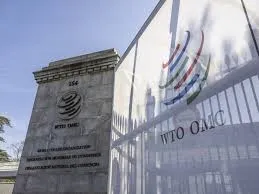
Trump Tariffs: WTO Forecasts 1% Decline in Global Trade
The World Trade Organization (WTO) has projected a 1% contraction in global merchandise trade volumes for 2025, attributing this decline to the recent tariff measures implemented by the United States. On April 2, 2025, President Donald Trump announced a 10% baseline tariff on all imports, with higher duties for countries perceived as engaging in unfair trade practices. These tariffs are set to take effect on April 5, 2025.
WTO Director-General Ngozi Okonjo-Iweala expressed concerns that these measures, along with other trade restrictions introduced earlier in the year, could lead to a significant slowdown in global trade. She emphasized the need for WTO members to address these tensions responsibly to mitigate potential adverse effects on the global economy.
The announcement of these tariffs has already had a notable impact on global markets. Major stock indices, including the S&P 500 and Nasdaq, experienced significant declines, reflecting investor apprehension about escalating trade tensions and their potential to trigger a global recession.
In retaliation, China imposed a 34% tariff on all American imports starting April 10, 2025, and restricted exports of critical rare earth elements. These actions have intensified fears of a global trade war and prompted calls from international organizations for a resolution to the escalating disputes.
The International Monetary Fund (IMF) and the Asian Development Bank (ADB) have also warned that such tariff escalations pose significant risks to global economic growth, particularly affecting developing economies that rely heavily on trade. They highlighted that higher tariffs could disrupt global supply chains, reduce investment, and hinder economic development.
As the situation evolves, the global community remains watchful of further developments and potential countermeasures from affected nations. The WTO continues to advocate for dialogue and cooperation among member countries to prevent further deterioration of global trade relations.
Leave a Reply